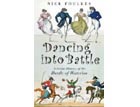Book Review: A Social History of the Battle of Waterloo.
Very English humour and a splendid cast of characters, led by the ever-enthralling Wellington, bring the Battle of Waterloo to life for Hugh Massingberd


Dancing into Battle: A Social History of the Battle of Waterloo
Nick Foulkes
(Weidenfield & Nicolson)
Nick Foulkes gives the impression that he might have strayed from the pages of Thackeray's novel Vanity Fair. Certainly, his relish for the Regency period is infectious, and he does eloquent justice to the dramatic potential of Waterloo.
What fascinates Mr Foulkes about the great battle is 'its unique situation straddling two centuries'. He points out that it belongs to both eras: 'the barbarously elegant England of the Regency, with its relaxed attitude to sex, alcohol and violence; and the imperial England of Queen Victoria, with its improving zeal, conspicuous virtue and high (albeit occasionally hypocritical) moral standards.'
The author adeptly captures the frivolous atmosphere of the expatriate community in Brussels where the 'divide between civilian and military life became so blurred as to be virtually non-existent, with non-combatants riding out to "enjoy" the battle'. He shows how individuals stepped from the ballroom to the battlefield and back again, thereby 'bringing warfare closer to the sporting activities associated with a house party in the country'.
The Duke of Wellington himself, as Mr Foulkes notes, was dressed for the battle 'not in uniform, but in the sort of clothes a gentleman might wear out riding'.
Sign up for the Country Life Newsletter
Exquisite houses, the beauty of Nature, and how to get the most from your life, straight to your inbox.
Wellington is one of those stars about whom one never tires of reading, and his 'mask of imperturbality' is sympathetically analysed. The author deftly handles a large cast of characters, including the domineering Duchess of Richmond, the hostess of the legendary ball shortly before the battle; Wellington's mistress, Lady Frances Wedderburn-Webster ('translucent-skinned, pearl-necklaced stupidity'); the giant prize-fighter Corporal John Shaw of the Life Guards, who became a regimental mascot and working-class hero, and whose death in battle was later immortalised in the 'Deeds of Daring Library'; and the lusty, flamboyant cavalry commander the Earl of Uxbridge, celebrated for his cool observation to the Duke: 'By God, sir, I've lost my leg.'
Amputations yield some of the best anecdotes. One amputee is recorded as having asked for the return of his arm, so that he could shake its hand before it was disposed of. Another hit a whingeing French casualty with his severed arm, saying: 'Here, take that, and stuff it down your throat, and stop your damned bellowing!'
Other reviews this week:
Unmitigated England: A Century Lost and Found
Country Life is unlike any other magazine: the only glossy weekly on the newsstand and the only magazine that has been guest-edited by HRH The King not once, but twice. It is a celebration of modern rural life and all its diverse joys and pleasures — that was first published in Queen Victoria's Diamond Jubilee year. Our eclectic mixture of witty and informative content — from the most up-to-date property news and commentary and a coveted glimpse inside some of the UK's best houses and gardens, to gardening, the arts and interior design, written by experts in their field — still cannot be found in print or online, anywhere else.
-
 380 acres and 90 bedrooms on the £25m private island being sold by one of Britain's top music producers
380 acres and 90 bedrooms on the £25m private island being sold by one of Britain's top music producersStormzy, Rihanna and the Rolling Stones are just a part of the story at Osea Island, a dot on the map in the seas off Essex.
By Lotte Brundle
-
 'A delicious chance to step back in time and bask in the best of Britain': An insider's guide to The Season
'A delicious chance to step back in time and bask in the best of Britain': An insider's guide to The SeasonHere's how to navigate this summer's top events in style, from those who know best.
By Madeleine Silver